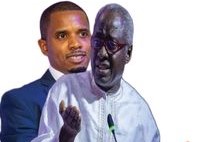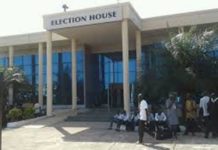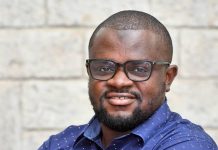Transcribed by Yankuba Jallow
Halifa Sallah: I was surprised when he [Dr Ceesay] said the civil service is bloated – meaning the objective is to reduce it. What I have seen is that we do not have the type of civil service that can currently address the challenges. When you talk about the hospitals, how many doctors and nurses? Look at the number of qualified teachers. I don’t think we have enough people who can render service.
The type of economy he is talking about leads to contraction – economic contraction. It also leads to retrenchment of civil servants because you are not building the productive base. Where will he [Dr Ceesay] get the money to run an enlarged civil service? He [Dr Ceesay] does not know where to get it and that is why they are recommending to retrench….. He [Dr Ceesay] feels that the civil service is bloated and therefore, he will reduce it. Is that your position?
Dr Ismaila Ceesay: What I mean by it is bloated, it means it is over-staffed. We need to streamline the civil service and do what we call “RRR” – Retrench, Retrain and Reintegrate. What is happening now in the civil service is we have messengers in the civil service. We still have drivers in the civil service. We need to reform it so that some of the services that the civil service need especially in the offices can be served by the private sector. Why having the paramilitary guarding public installations and not giving it to private security firms? Why have the civil government employing people to clean offices and not outsourcing it to private cleaning firms. This creates jobs and it helps formalize the very large informal economy.
My argument is that the civil service is too big and it is not fit for purpose. We need to streamline it to make it more effective by bringing what we called the confluence of the civil service and technology to bring more efficiency.
Halifa Sallah: The issue he mentioned is that you will retrench, retrain and put them back there.
Dr Ismaila Ceesay: Reintegrate means you take them to places where they can be more productive.
Halifa Sallah: The problem is that they are not trained. Is that what you are saying?
Haruna Drammeh (the moderator of the debate): For clarity, are we talking here about the quality or quantity. Let’s find a convergence here. If you say it is bloated, are you saying there are so many incompetent people?
Dr Ismaila Ceesay: Not incompetent, but some people who are not serving any purpose in the civil service. They must be removed from the civil service and retrain for other sectors. There are other sectors that need people. Today, as we speak, in our 10 Point Plan, we pledge that we are going to provide 100,000 jobs within 5 years. The Gambia has the potential to tap into the services sector. If you look at Gambia’s position, it is strategically located similar to Djibouti along the Red Sea; is just that Djibouti is inside Ethiopia and today they are one of the most vibrant maritime service industries. The Gambia today, we can bring new innovation – new products to increase tourist arrivals from roughly 200,000 to a million tourists.
Haruna Drammeh: Is your issue about quality and the numbers at the same time?
Dr Ismaila Ceesay: We need quality.
Haruna Drammeh: Does that answer your question, honourable [Sallah]?
Halifa Sallah: In fact, I am getting more and more confused because what I am beginning to question is whether the plan is really to eradicate poverty in The Gambia. If you look at the pay that the civil servants are receiving now and you look at the package, and with that you saying you are going to reduce and expect that you are saving something that will facilitate greater development. Essentially, what I am being told is that there is no answer to the poverty of our country. And if that is added to the whole issue that you are brandling a free market, where is the free market in The Gambia?
For 56 years, every Government aims to build a free market. How many people are actually earning to have business in the Gambia that can employ the type of population that you are talking about? Where is the free market in the Gambia?
Dr Ismaila Ceesay: Can I ask a question?
Haruna Drammeh: You may answer. You may answer – where is the free market?
Dr Ismaila Ceesay: The free market is existing. It is just that its potential has not been maximized because the enabling environment has not been created by previous governments. We did not build human capital which is a prerequisite to have a vibrant free market system. We did not build the relevant infrastructure which is a prerequisite and we do provide the right legal framework to fight corruption so that investors can have confidence in the market and bring in global wealth. You don’t blame the free market for that. You need to blame the ineffective, corrupt and inefficient governments for that and not the free market.
Halifa Sallah: Where will this people invest when they come? Are they going to invest in land?
Dr Ismaila Ceesay: Well, there are many sectors.
Halifa Sallah: Sectors like?
Dr Ismaila Ceesay: Service sector and the agricultural sector.
Halifa Sallah: Service! You already have Africell, Gamcel and all of these telecom companies.
Dr Ismaila Ceesay: There is tourism, technology, banking, and insurance. So, the service sector is not only about telecommunication.
Halifa Sallah: The service sector is a sector that employs very few people because of high tech. Any efficient service sector will not be talking about increasing employment. It is not a sector that employs. It is a sector that relies on technology. It replaces human beings. That is the reality.
So, the service sector is necessary. The private sector is necessary, but the private sector in this country cannot grow to a level where you can have eradication of poverty.
The difference between The Gambia and Sweden and Norway is that they have a private sector that blossom to a point that you can tax the private sector in order to provide for those who are not employed, the elderly and those with children – so you can provide social welfare. The difference between those countries and this country is, we do not have a private sector tax because they are already over taxed and you cannot do to that for the private sector to be able to give you what you need to deal with poverty.
So, what we [referring to PDOIS] are saying, yes, we have a consumption base welfare for countries that have big private sectors to tax, but you must have production base welfare for countries that do not have that. That is why you must have a cooperative bank in order to provide that resource that the farmers need.
Dr Ismaila Ceesay: The system that PDOIS is trying to talk about in the “Gonga” has been tried elsewhere and it has failed. I think the system they are talking about is a repackaged communism – communism of the 21st century. It cannot work. It has not worked. It has failed. Countries that were able to transform their societies within a very short period of time relied on the expansion of the private sector and attraction of global capital, Rwanda and South Africa. South Africa after the apartheid, Mandela, who in fact at one point was left-wing leaning and befriending Fidel Castro, when he [Mandela] became President, he changed course and started orienting South Africa towards private sector led-growth. Even China, how did they fight poverty and bringing hundreds of millions of people out of poverty within a very short-period of time? It is because they were able to learn the wisdom that too much government central planning have been tried and it has failed in Cuba, it has failed in North Korea, it has failed in Soviet Union. It has failed and failed and it didn’t work. My question is, can the Honourable [Halifa Sallah] tell me where the cooperative system was used and poverty was eradicated?
Halifa Sallah: The country where he [Dr Ceesay] studied,the country that educated him [Dr Ceesay]. Today, Norway has what we called sovereign national wealth. The oil money of Norway is why poverty is eradicated in Norway because that money is sovereign national wealth. That is what is meant by sovereign national wealth. The type of logic that you have is not based on fact. It is based on fiction because if you look at the countries you have mentioned, whether the Soviet Union or other countries, those countries are still prospering to a certain degree based on the foundation they have established.
Dr Ismaila Ceesay: [Interrupted] because of short therapy.
Haruna Drammeh: Allow him to answer the question.
Halifa Sallah: [Continued] and now those foundations have failed in certain respect and you can see the impact. But it is very clear that whether in the Middle East, other Arab countries, whether in Norway or other countries in the Scandinavian countries, sovereign national wealth is the basis of eradication of poverty in this world. Whether in China, whether in Rwanda or any other country you mentioned, any where you don’t have sovereign national wealth, it is not possible to sustain development. That is the emphasis.
What you are doing is just name calling and we [PDOIS] are saying how many vessels could have been put in the ocean by now? How many licensed vessels do we have? How much have they paid? How many have been captured and taken to the courts? All that we could have bought fishing vessels and they could have been plying our waters and bringing resources to the nation, putting it in a bank and the Cooperative Bank would have taken route and will be sending our children from GTTI into the productive base, from the farm into the productive base, women from the garden into the productive base – that is the way of the future.
No body is saying exclude the private sector. The private sector has its place. The private sector at this moment, 1.6 billion dollars is what is traded in foreign exchange in our banks, but where is it in our productive base? That is the role of the private sector. The Government has no business in owning hotels. That should go into the hands of the private sector. That is where the private sector should invest. But the land that the people owned, [and] you give it to foreign investors to take over your land, employ your women to go and work there for pittance while they export and make billions. Is that the type of system he [Dr Ceesay] is talking about? If PDOIS is in charge of this country, not a single land will be sold by the Government. Everything will go into the hands of the Gambian people in terms of ensuring the Gambian people work for their development. That is what we are talking about. The gardens in Kafuta etc should be owned by our people and the cooperative bank will be able to assist them to get the resources to be able to produce. That is what we are talking about.
Dr Ismaila Ceesay: I got confused. The system is so vague that I got confused. Norway did not build their sovereign wealth through a centrally planned cooperative system but tapping from their oil resources. Sweden did not build their sovereign wealth through a centrally planned cooperative system, but it was built by what we called the mixed-economy where the State allows free enterprise, innovation and ingenuity but also the State comes in to ensure that the market is regulated.
On labour, we cannot allow investors to exploit our people and pay them less than their value. That depends on the government in power. Once a serious government puts in the right regulatory framework in place, the right laws, the right labour laws – no investor will come and exploit our people. When you come to invest in the Gambia, you must work under the framework – our environmental laws and our labour laws – but also, in a free market economy, there is nothing wrong …. Nobody is saying that all our lands will be owned by foreigners. There are young Gambians who can invest in The Gambia, own land, own fishing trawlers. Haruna, it has been tried and tried and tried when government goes into business, they fail, because governments are not good at making business. They are good at making the right regulatory frameworks so that money is created and that wealth government is invested in the people, schools, water, electricity, roads and healthcare.
Halifa Sallah: How are you getting money from the Saudi Fund, Kuwaiti Fund and all these funds in the Middle East? You mean all those investments in oil is owned by private owners outside or it is in the hands of the Saudi Government and others? Do you really know how those people manage and accumulate wealth? You are saying Norway does not accumulate sovereign national wealth.
Dr Ismaila Ceesay: I did not say that. I said they get their sovereign national wealth not by a centrally planned cooperative system by tapping into their oil resources.
Halifa Sallah: The oil money is going where?
Dr Ismaila Ceesay: Is going into the sovereign wealth.
Halifa Sallah: Who is in control of the sovereign wealth?
Dr Ismaila Ceesay: The State.
Halifa Sallah: So, now, what are you talking about?
Dr Ismaila Ceesay: No, no.
Halifa Sallah: What are you talking about?
Dr Ismaila Ceesay: No, no.




















